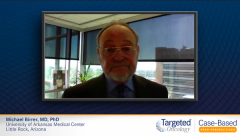
KEYNOTE-158: Pembrolizumab Use in Advanced Endometrial Cancer
Michael Birrer, MD, PhD, considers the role of pembrolizumab in advanced endometrial cancer given results from KEYNOTE-158.
Episodes in this series

Case: A 70-Year-Old Woman With Endometrial Cancer
Initial Presentation
- A 70-year-old postmenopausal woman presents after experiencing abnormal uterine bleeding for about 3 months. She has a grown daughter, underwent menopause at 52 years of age, and her father had prostate cancer in his late 60’s.
- PMH: Unremarkable
- PE: Notable for large uterus and tenderness upon palpation
Clinical work-up
- Endometrial biopsy: endometrioid adenocarcinoma, FIGO grade 1
- Surgery: ELAP TAH BSO with bilateral pelvic node dissection
- Pathology: grade 2 endometrioid adenocarcinoma, 15 negative pelvic nodes, invasive 1.9 cm of 2.4 cm myometrium
- Molecular testing shows MSI-high, MMR proficient, and HER2-
Treatment
- Postoperative radiotherapy: vaginal cuff brachytherapy to a dose of 21 Gy in 3 fractions
- 12 months after completing radiotherapy, she presented with new RLE edema and right hydroureter
- She then was treated with carboplatin/paclitaxel chemotherapy which was well tolerated
Treatment
- 15 months later the patient has disease relapse with metastases to the paraaortic lymph nodes
- She is now treated with pembrolizumab
Transcript:
Michael Birrer, MD, PhD: There’s a rationale for the use of immuno-oncology drugs like pembrolizumab in tumors that have a DNA-repair abnormality, particularly if the DNA-repair abnormality is mismatch repair. This results in the slipping of DNA as it gets replicated so that you add an extra base here and there, which then produces an abnormal protein that the body hasn’t seen. We call that a neoantigen. These mismatch repair–abnormal tumors are loaded with new proteins that the body recognizes as foreign. The immune system reacts. And the tumors are clever, so they begin to put the T cells asleep, if you will, through a number of mechanisms, including PD-1. A drug like pembrolizumab, which activates T cells by inhibiting that pathway, anti–PD-1, will activate all these T cells, which will then fight the tumor. That’s why we see such dramatic responses in these types of tumors to those agents.
That was the rationale. It evolved while the trials were ongoing, but it made a lot of sense. The classic trial for this tumor is KEYNOTE-158, which was a basket trial. It was essentially designed across many tumors, not just endometrial cancer. There were 2 cohorts, D and K, that had endometrial cancers in there, and many had mismatch repair abnormalities. It was a basket trial, so these aren’t randomized prospective phase 3 trials. These are single-arm trials. The fact that the FDA eventually approved the drug based on that tells you how dramatic the results were. If you look at a summary of the endometrial portion of KEYNOTE-158—and Dave O’Malley’s paper, a great summary in the Journal of Clinical Oncology—demonstrated that in MSI [microsatellite instability]–high endometrial cancers, response rate was close to 50%.
More important, we’re talking about recurrent metastatic endometrial cancer, which has already been treated with chemotherapy. These are patients who can’t be cured or haven’t been able to be cured. These are patients whose progression-free survival [PFS] is very short. They don’t do well. In this study, there was close to 50% response rate. The duration response, as reported in that review paper, wasn’t reached, meaning that they have incredible durable responses because once you activate those T cells, they keep fighting the tumor. The overall response had not been reached. The median PFS was 13.1, but that’s a little misleading because those are patients who’ve actually recurred. The main takeaway is the high response rate in a previously untreated tumor and 2 of the durations of response were home runs, which is quite spectacular.
There were no surprises in KEYNOTE-158 in terms of toxicity of this drug or tolerability. The immuno-oncology drugs do have some autoimmune phenomenon, hyperthyroidism, and thyroid abnormalities between 10% and 15%. That was present here. Others on the list were absolutely in line with what we’re used to for immuno-oncology drugs. There was no additional signal. In general, my experience in what was reported in the KEYNOTE-158 was a very tolerable regimen. These patients were frequently on this for up to 35 cycles. That’s a lot of treatment, and that reflects that it was very well tolerated.
Transcript edited for clarity.








































